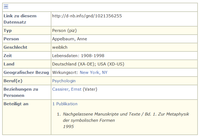 GND: Screenshot of the German National Library. | |
| Acronym | GND |
|---|---|
| Organisation | DNB |
| Introduced | 5 April 2012 |
| Example | 7749153-1 |
| Website | d-nb |
The Gemeinsame Normdatei (translated as Integrated Authority File, also known as the Universal Authority File) or GND is an international authority file for the organisation of personal names, subject headings and corporate bodies from catalogues. It is used mainly for documentation in libraries and increasingly also by archives and museums. The GND is managed by the German National Library (German: Deutsche Nationalbibliothek; DNB) in cooperation with various regional library networks in German-speaking Europe and other partners. The GND falls under the Creative Commons Zero (CC0) licence.[1]
The GND specification provides a hierarchy of high-level entities and sub-classes, useful in library classification, and an approach to unambiguous identification of single elements. It also comprises an ontology intended for knowledge representation in the semantic web, available in the RDF format.[2]
The GND became operational in April 2012 and integrates the content of the following authority files, which have since been discontinued:
- Personennamendatei (PND) (Translation: Name Authority File)
- Gemeinsame Körperschaftsdatei (GKD) (Translation: Corporate Bodies Authority File)
- Schlagwortnormdatei (SWD) (Translation: Subject Headings Authority File)
- Einheitssachtitel-Datei des Deutschen Musikarchivs (DMA-EST) (Translation: Uniform Title File of the German Music Archive)
It is referred to by identifiers named GND-ID.
At the time of its introduction on 5 April 2012, the GND held 9,493,860 files, including 2,650,000 personalised names.[citation needed]
Types of GND high-level entities[edit]
There are six main types of GND entities:[3]
| Typ | German (official) | English (translation) |
|---|---|---|
| p | Person | person |
| k | Körperschaft | corporate body |
| v | Veranstaltung | event |
| w | Werk | work |
| s | Sachbegriff | topical term |
| g | Geografikum | geographical place name |
See also[edit]
References[edit]
- ^ www
.dnb .de /EN /Professionell /Standardisierung /GND /gnd _node .html Integrated Authority File (GND) - ^ GND Ontology – Namespace Document Archived 2013-01-03 at the Wayback Machine, version 2012-06-30.
- ^ „Entitätencodierung – Vergaberichtlinien“ (pdf)
External links[edit]
- Information pages about the GND from the German National Library
- Search via OGND (Bibliotheksservice-Zentrum Baden-Württemberg)
- Bereitstellung des ersten GND-Grundbestandes Archived 2012-10-20 at the Wayback Machine DNB, 19 April 2012
- From Authority Control to Linked Authority Data Presentation given by Reinhold Heuvelmann (German National Library) to the ALA MARC Formats Interest Group, June 2012
Well, that’s interesting to know that Psilotum nudum are known as whisk ferns. Psilotum nudum is the commoner species of the two. While the P. flaccidum is a rare species and is found in the tropical islands. Both the species are usually epiphytic in habit and grow upon tree ferns. These species may also be terrestrial and grow in humus or in the crevices of the rocks.
View the detailed Guide of Psilotum nudum: Detailed Study Of Psilotum Nudum (Whisk Fern), Classification, Anatomy, Reproduction